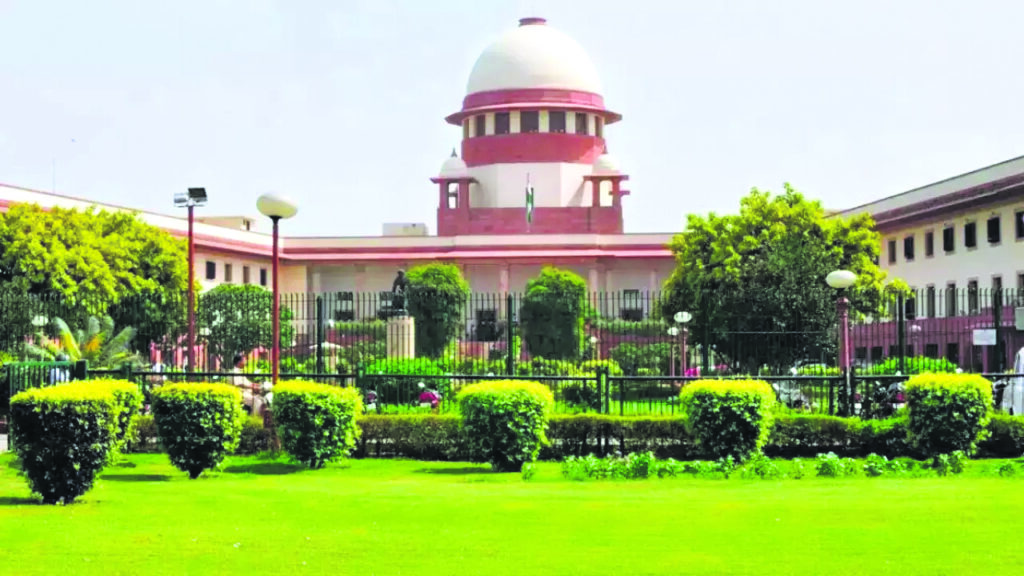Aarohi Girish Dhumale
On 8th November 2024, the Supreme Court ruled that the doctrine of lis pendens applies even when the petition for review is pending in the registry in a defective condition.
This case was heard by a bench of Justice D.Y. Chandrachud, Justice J.B. Pardiwala, and Justice Manoj Misra.
This case arises as an appeal out of a 2022 judgment. The petitioner filed a request for review under Article 137 of the Constitution and Order XLVII Rule 1 of the Supreme Court Rules 2013. In that decision, the Court had allowed an appeal and partially ruled in favor of the petitioner, directing that a property be registered in the petitioner’s name in proportion to the amount of money already paid. The main question for review was whether the judgment contained an obvious mistake that justified reopening the case. In 1994, the original owners had agreed to sell land to the vendors, and after the full payment was made, the vendors got the possession of the entire property.
Despite the full consideration price being paid, a sale deed was never executed. Instead, an irrevocable power of attorney was granted to the vendors. Later, the vendors signed an agreement to sell the property to the petitioner, who was the buyer.
In 2000, the petitioner sent a legal notice to the respondents, asking them to accept the remaining balance and execute the sale deed. After a second notice, the respondents responded, claiming that the execution was barred by the limitation period. As a result, the petitioner filed a suit seeking a decree for specific performance of the agreement. The Trial Court dismissed the suit and an appeal was filed by the petitioner in the High Court. The High Court partially allowed the appeal, but the Supreme Court ruled that the suit was barred by limitation. The present review petition filed by the petitioner filed is a result of the decision of the Supreme Court.
The Court said that before the 2018 amendment, Section 10 allowed the Court to exercise its discretion to grant specific performance of a contract under two conditions: (a) where there is no standard method to determine the actual damage caused by the non-performance of the agreed act, or (b) when the agreed act is such that monetary compensation for its non-performance would not provide adequate relief. The Explanation clarified that, unless otherwise specified, the Court would assume that monetary compensation is not an adequate remedy in cases involving the breach of a contract to transfer immovable property. In this case, there is no evidence in the agreements to sell that would rebut this statutory presumption. The Court held that this is a fit case for the Court to direct specific performance by exercising its discretion. The Court referred to Section 52 of The Transfer of Property Act which prohibits the transfer of a property while a litigation is pending, except if such a transfer has been ordered by a Court on the terms imposed by it.
“Where one of the parties to the suit transfers the suit property (or a part of it) to a third-party, the latter is bound by the result of the proceedings even if he did not have notice of the suit or proceeding” said the Court.
The Court remarked that the purpose of the doctrine of lis pendens is to prevent the court’s process from being undermined or rendered futile. Without this doctrine, a defendant could frustrate the suit by transferring the disputed property. This objective is clearly outlined in the Explanation to Section 52, which defines ‘pendency’. The 1929 Amending Act replaced the term ‘active prosecution’ with ‘pendency’ and also introduced an Explanation that defines ‘pendency of a suit or proceeding’. According to this definition, ‘pendency’ begins from the ‘date of institution’ of the suit and continues until its ‘disposal’. The respondents’ argument that lis pendens does not apply because the petition for review was pending in the registry in a defective state cannot be accepted.
The Court held that Section 52 of the Transfer of Property Act applies to a third-party buyer when a property sale happens after a review petition is filed in court. This means that any transfer of property during the ongoing case will be affected by the final decision of the court.
The Supreme Court allowed the review petition and reinstated the High Court’s judgment.
Case Name: Siddamsetty Infra Projects Pvt. Ltd v. Katta Sujatha Reddy & Ors
Case Number: Review Petition (C) No. 1565 of 2022 in C.A. No. 5822 of 2022
Bench: Justice D.Y. Chandrachud, Justice J.B. Pardiwala, and Justice Manoj Misra
Click here to access the order dated 08.11.2024
Instagram: Click here
LinkedIn: Click here
For Collaboration and Business: info.desikaanoon@gmail.com

